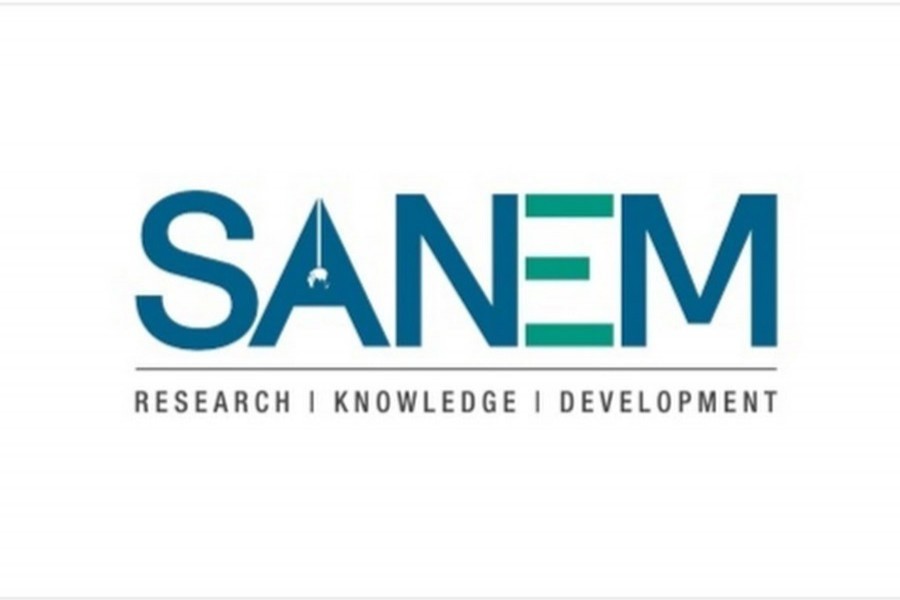Economists at a webinar on Sunday urged the government to focus on policy reforms to boost private sector investment which is essential to stimulate the post-COVID recovery process.
They also remarked that in the absence of comprehensive data collected by national statistical agencies such as Bangladesh Bureau of Statistics (BBS), it is extremely challenging for policymakers to identify, target or design effective policies to help the worst affected groups of the populations.
The observations came up with the webinar organised by South Asian Network on Economic Modeling (SANEM) titled "Budget 2021-22: Reality and Expectations" to discuss the importance of the national budget in addressing the challenges of the ongoing pandemic.
Dr Selim Raihan, Professor of Economics Department at Dhaka University and Executive Director of SANEM said since the budget for FY22 is going to be the second budget announced during the pandemic, policymakers should primarily focus on addressing the urgent needs that have emerged due to the ongoing crisis.
"It is extremely important for the policymakers to come to terms with the reality of the current situation and acknowledge the gravity of the socioeconomic crisis that the country is currently facing," he said, stressing the importance of COVID-19 management related budget allocations to salvage the health sector through ensuring timely vaccination drives, border controls and building capacity of the medical workforce.
One of the key issues that he highlighted is the lack of proper data collection and monitoring since the beginning of the pandemic.
He also referred to the findings of SANEM's ongoing quarterly Business Confidence Survey which reveal that micro, small and medium enterprises (MSMEs) have been most negatively impacted due to the pandemic.
Despite the severity of the impact, government stimulus packages for MSMEs have been inadequate, making it even more difficult for them to survive through this unprecedented crisis. As these MSMEs play a vital role in the supply chain and also create employment opportunities for the majority of the workers working in the informal sector, the recovery of the MSMEs is a major contributing factor to the recovery of the economy as a whole.
Dr Raihan mentioned that, although GDP growth rate is an important measure to assess the advancement of the economy, it is high time for policymakers to come out of the obsession of repeatedly using GDP and instead focus on socioeconomic indicators such as poverty, inequality and employment to assess the wellbeing of the nation.
"The government needs to properly define the corporate social responsibility of the various business associations. Business associations have an important role to play in this time of crisis. But unfortunately we have seen that at this time they are more occupied with their own demands," the economist added.
Dr Sayema Haque Bidisha, Professor of Economics Department at Dhaka University and Research Director of SANEM delivered the keynote presentation.
Dr Sayema acknowledged that the budget for the next fiscal year would have to consider both pre-COVID as well as post-COVID challenges.
She pointed out that the existing budget structure suffers from low revenue generation and slow implementation of ADP. Furthermore, despite the consistently high growth in GDP, the pace of employment generation has not been impressive and there has been low spending in human resource development.
"In addition, the pandemic has now impacted the livelihoods of millions due to job losses, business closures and reduction in income. A digital divide has become evident in the education sector and rise in dropout rates and early marriages have emerged as major concerns. In this context, the upcoming fiscal budget will play a critical role in dealing with the pandemic fallouts," she added.
The presentation highlighted a declining trend in revenue collection in the recent budgets: 83 per cent of the actual revenue target was met in the FY17 which decreased to 75per cent in FY18 and 74 per cent in FY19.
A closer analysis of the composition of the NBR tax revenue reveals that the proportion of income tax in the overall revenue has also declined over the past 5 years. In FY17, income tax made up 35.4 per cent of the total tax revenue while in FY21, it declined to only 31.5 per cent.
The government's Annual Development Programme (ADP) implementation rate has also been staggeringly low in the current fiscal year. ADP implementation progress over July 2020-April 2021 has been below 50 per cent across several key ministries and divisions including Health Services Division, MoPME, MoHPW, Ministry of Industries, Medical Education and Family Welfare Division, MoWCA, MoSW, Food, Labor and Employment, Planning Division. Furthermore, government domestic borrowing in financing the national budget has also increased from 14.8 per cent in FY20 to 19.4 per cent in FY21.
Dr Sayema stressed that the prime objective of the upcoming fiscal budget should be to ensure better health management while restoring the income level of people through employment generation. To attain this objective, she mentioned four key areas of priority: Health, Education, Social Safety Net and Agriculture.


